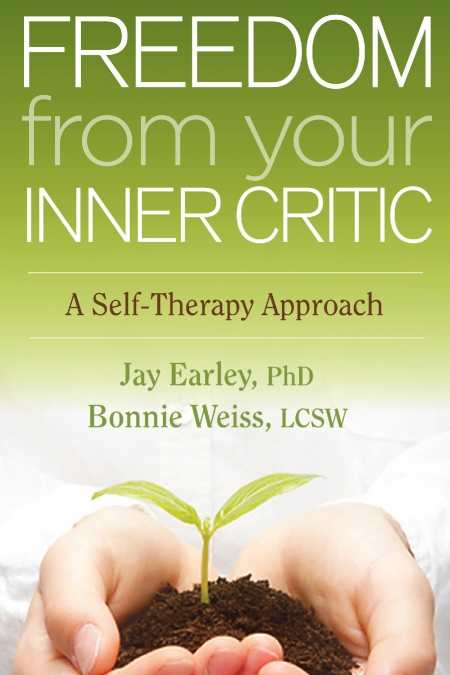Freedom from Your Inner Critic
A Self-Therapy Approach
By making seemingly abstract concepts concrete, two psychologists offer a self-therapeutic method for quieting one’s most harmful self-doubts.
At one time or another, virtually everyone has dealt with an internal voice that undermines self-confidence or even the ability to function. In this comprehensive self-help guide, psychologist Jay Earley and psychotherapist Bonnie Weiss offer specific strategies and tactics designed to blunt the negative damage caused by this voice, which they label the “Inner Critic.”
In a logical fashion, the authors provide a full discussion of the Inner Critic, detailing seven specific types of critics that people might have, including “The Perfectionist,” who has “very high standards for behavior, performance, and production,” and “The Guilt Tripper,” who “constantly makes you feel bad and will never forgive you.” The authors make the surprising point that the Inner Critic is “actually trying to help us” because it “thinks that pushing and judging you will protect you from hurt and pain.” As a result, they advise the reader to form a “positive connection” with the Inner Critic and understand its motivation.
Identifying these Inner Critic types as living persons, one of the defining aspects of the book, allows the authors to introduce Internal Family Systems Therapy (IFS). As the authors explain, the IFS process encourages individuals to reach back into the past to discover their “Criticized Child” and work to heal it, thus reducing the influence of the Inner Critic. IFS also enables individuals to discover both an “Inner Champion,” a voice that could represent “the ideal supportive parent that you always wished you had,” and an “Inner Mentor,” a voice that “helps you to see where you can improve yourself” in a much less destructive way than the Inner Critic.
In walking the reader through the discovery process, Earley and Weiss utilize helpful examples from their practices to make seemingly abstract concepts concrete. For example, Earley includes several excerpts from his sessions with a client, George, to demonstrate how George dealt with a mistrustful Inner Critic and healed a Criticized Child. In addition, the authors include several simple exercises as well as “Help Sheets” (step-by-step guided exercises) that pave the way for the reader to use the IFS process effectively.
Perhaps one of the more interesting chapters in the book addresses how to apply understanding the Inner Critic to overcoming addictions. Addictions pit two opposing forces against one another, write the authors: the “Indulger” (the addictive part) and the “Inner Controller” (the Inner Critic part). They suggest that, in order to cure an addiction, “you must heal and transform both the Inner Controller and the Indulger.”
The authors write with clarity, precision, and authority. Clearly, not everyone will be able to rid themselves of internal struggles simply by reading this book; however, those with the discipline to follow the authors’ programmatic approach from start to finish could see significant results.
Reviewed by
Barry Silverstein
Disclosure: This article is not an endorsement, but a review. The publisher of this book provided free copies of the book to have their book reviewed by a professional reviewer. No fee was paid by the publisher for this review. Foreword Reviews only recommends books that we love. Foreword Magazine, Inc. is disclosing this in accordance with the Federal Trade Commission’s 16 CFR, Part 255.


